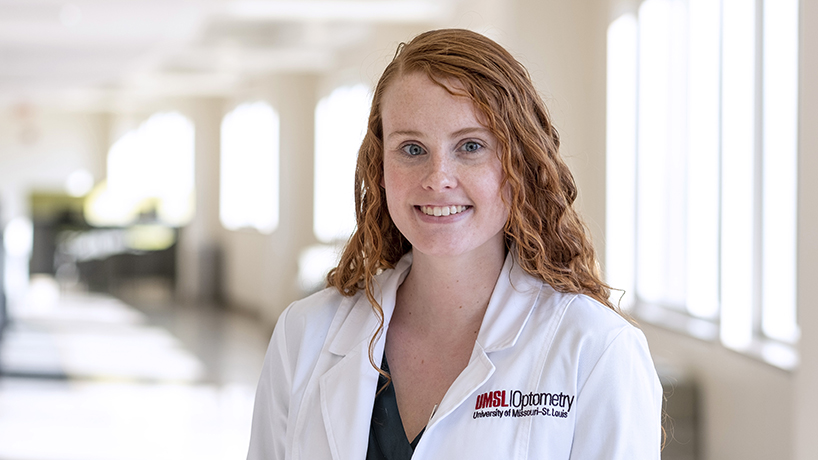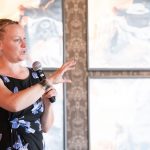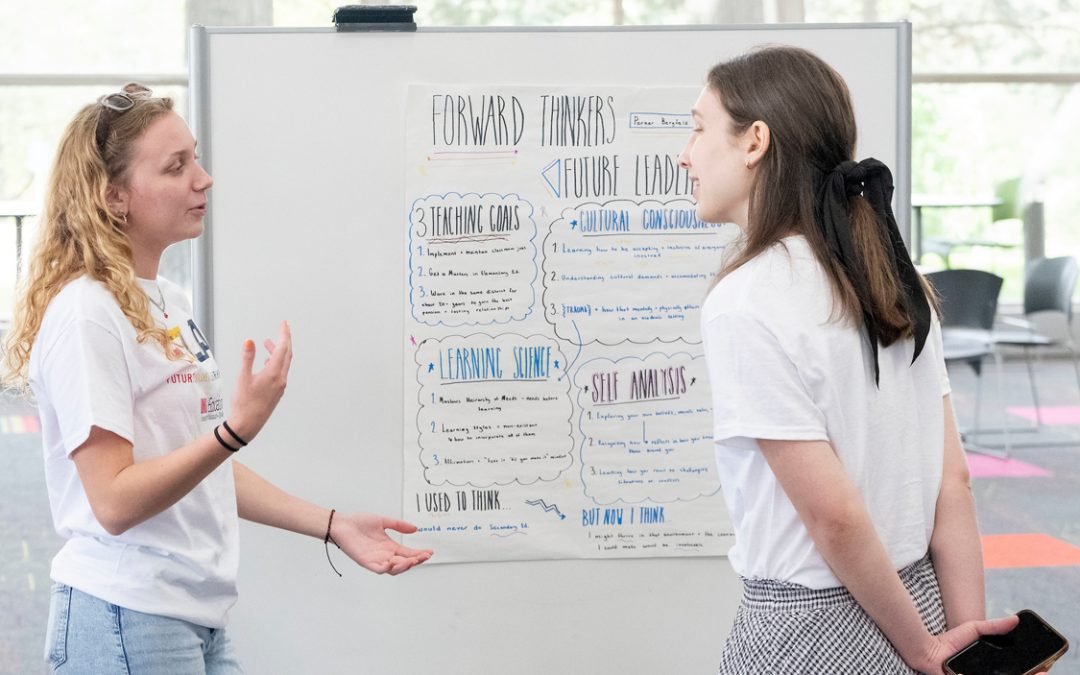
Riley Liss was born with severe hearing loss, but the College of Optometry student doesn’t let that limit her education or career. She cites support from UMSL staff and faculty as being instrumental to her success. (Photo by August Jennewein).
The only test that Riley Liss ever failed happened early. So quickly, in fact, that she hadn’t even started school yet.
That’s because she’d just been born.
Liss’ parents immediately noticed how she failed to react to sounds unless they were super loud. Then would startle, as if the noise had snuck up on her. Pretty soon she had a diagnosis: moderate to severe hearing loss in both ears.
“I failed the newborn screening at the hospital, and I got my first pair of hearing aids at 6 months old,” Liss said. “But I’m a very independent person. I work hard for everything. I just had to work a little bit harder for certain things.”
Liss’ efforts have paid off, and she’s now a student in the College of Optometry at the University of Missouri–St. Louis. Drawn to the profession’s strong patient connections, she’s poised to enter her final year and hopes to go into private practice after graduation.
Always interested in a medical profession, Liss became drawn to optometry in college after shadowing her optometrist in her northeast Iowa hometown.
“I was like, ‘I liked this; I could see myself doing that,’” she said. “Shadowing was the biggest thing that showed me where I wanted to go.”
UMSL was the first optometry school where Liss interviewed, and she liked the small class sizes and supportive staff, such as Director of Student and Alumni Services Nick Palisch. She wanted to give each school a fair shot before deciding but recalls her dad predicting she’d pick UMSL in the car ride home.
At UMSL, Liss quickly made herself at home in the tight-knit optometry school, bonding with a group of close friends, who now live together in a house that’s long been a favorite with optometry students.
“One of our professors lived there when she went to school here, which is about eight years ago,” Liss said. “She thinks it’s funny that we live there now.”
Liss has also gotten involved with optometric organizations, such as the American Optometric Student Association and the National Optometric Association and on campus with the Private Practice Club, the health and wellness committee and tutoring.
She’s also reaped the benefits of living in a larger city for the first time and has developed an appreciation for the availability of every type of cuisine, as well as St. Louis’ brewery culture.
The best part, though, is the optometry. Though Liss has enjoyed the didactic courses as she studies for boards, she’s thrilled to find herself making connections between material from her various classes.
But clinicals and patient interactions remain her favorite part.
“You never know who’s going to walk in your door,” she said. “You never know what you’re going to see. The biggest thing for me is what I can do. Like, ‘What is one thing I can do today while they’re in my chair to help them see better be better, get on with their daily life better?’”
That can range from prescribing glasses to helping someone see better to checking in on a patient who has had problems in the past to noticing a patient’s diabetes has become uncontrolled and referring that person to a primary care physician.
With its 22-credit-hour semesters, optometry is a notoriously difficult program. That could have been extra challenging because of her hearing loss, but Liss notes that the faculty and staff at UMSL have risen to her needs. One such individual has been Tara Cramer, manager student support services in Disability Access Services.
“For my classmates, or myself, the school is really good about providing accommodations,” she said. “There’s a lot of people that have helped me along the way. They are very good at what they do, and they are very willing to help.”
In addition to hearing aids, Liss uses a service called Communication Access Realtime Translation, which provides transcription of lectures, and a specialized blood pressure cuff and stethoscope. Because hearing aids point forward and make sensing noises from behind challenging, Liss makes sure to let her patients know up front about her hearing loss.
She also reads lips, and uses the skill to double check her understanding. Masks have made that more challenging both in class and with patients, though Liss appreciates the clear plastic versions.
When the pandemic first hit the U.S., she was worried about how the change might impact her education. Then clinicals got pushed from May to July.
“I had time to think about what I was going to need for patient care,” she said. “Honestly, everybody’s having the same issues. It’s not just me. It’s hard to hear through a mask. It makes my life harder, but it’s manageable.”
What’s helped has been recorded lectures with closed captioning, a tool that her classmates are also happy to use.
Liss notes that she doesn’t feel restricted because of her hearing loss, and she doesn’t think other people should either.
“It’s important that people know that you’re still able to do a lot of things,” she said. “You’re not limited in your life. I definitely hesitated when I was applying to school. I was like, ‘What if I can’t hear my patient?’
“You’ve just got to believe that you can do it. I know that it’s hard, but there are people here to help you. One of my biggest things is that a lot of people wouldn’t reach for those dreams if they don’t have the support that they need. I know that they’ll get a lot of support from UMSL faculty, and that’s important to me.”














